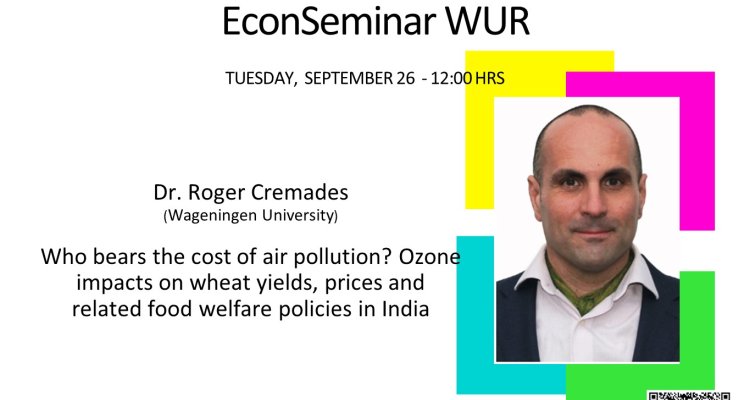
Seminar
Roger Cremades (WUR) “Who bears the cost of air pollution? Ozone impacts on wheat yields, prices and related food welfare policies in India."
On Tuesday September 26, Roger Cremades (UEC, WUR) will give a seminar on his paper entitled “Who bears the cost of air pollution? Ozone impacts on wheat yields, prices and related food welfare policies in India."
Abstract:
We assess wheat yield losses occurring due to ozone pollution in India and its economic burden on producers, consumers and the government. Applying an ozone-flux-based risk-assessment, we show that ambient ozone levels caused a mean 14.18% reduction in wheat yields during 2008-2012. Furthermore, irrigated wheat was particularly sensitive to ozone-induced yield losses, indicating ozone pollution could undermine climate-change adaptation efforts through irrigation expansion. Applying an economic model, we examine the effects of a counterfactual, ‘pollution-free’ scenario on yield losses, wheat prices, consumer and producer welfare, and government costs. We explore three policy scenarios in which the government support farmers at observed levels of either procurement prices (fixed-price), procurement quantities (fixed-procurement), or procurement expenditure (fixed-expenditure). In pollution-free conditions, the fixed-price scenario absorbs the fall in prices, thus increasing producer welfare by USD 2.7 billion, but total welfare decreases by USD 0.24 billion as government costs increase (USD 2.9 billion). In the fixed-quantity and fixed-expenditure scenarios, ozone mitigation allows wheat prices to fall by 38.19-42.96%. The producers lose by USD 5.10 to 6.01 billion, but the gains to consumers and governments (USD 8.7 to 10.2 billion) outweigh the losses. These findings show that the government and consumers primarily bear the costs of ozone pollution. For pollution mitigation to optimally benefit wheat production and maximise social welfare, the current policy of fixed-price grain procurement needs to be reconsidered and other ways found to support producers. We also emphasise the need to consider air pollution in programs to improve agricultural resilience to climate change.